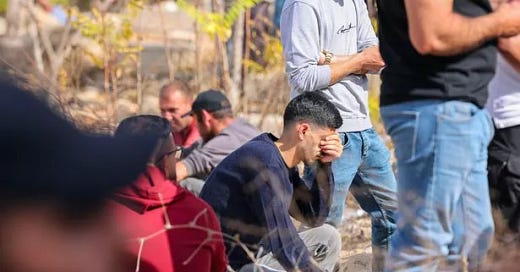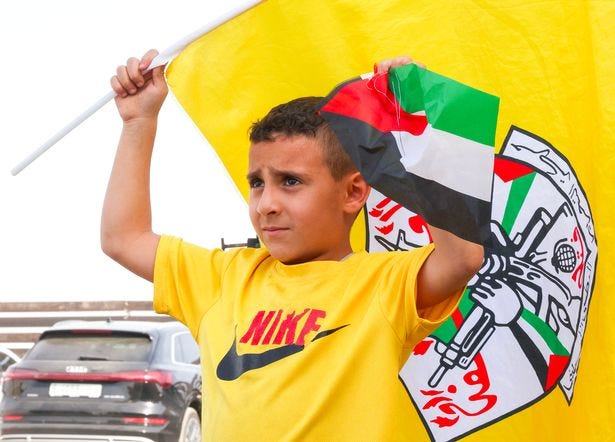Thousands of angry mourners bury two Palestinians shot dead
A sea of green Hamas flags outnumbering the yellow cloth banners of the West Bank’s ruling party Fatah waved through the dusty, winding streets of Jalazone Camp
To chants of “God is great,” declarations of hate towards Israel and its western allies more than a thousand seething men buried two more dead in the West Bank on Monday.
A sea of green Hamas flags outnumbering the yellow cloth banners of the West Bank’s ruling party Fatah waved through the dusty, winding streets of Jalazone Camp. Deafening loud speakers declared US President Joe Biden an “unbeliever,” and enmity to the US and UK hours after Mahmoud Makleh, 21, and Mohammed Aliyan, 20 were shot dead, apparently by Israeli troops. Coffins carrying these young men, draped in the Fatah flag, marked the 93rd and 94th West Bank deaths since the sickening Hamas October 7 massacre of Israelis.
As the Middle East braced for a Gaza ground-offensive which could spark a far wider regional conflict, the West Bank is now a boiling focal point for Israel’s third front. The country - mourning 1,400 deaths from the Hamas massacre and ensuing violence - is already engaged in cross border missile exchanges with Lebanese Hezbollah in the north.
Here in tiny Jalazone, Israeli forces carried out an operation as they made hundreds of arrests overnight across the West Bank. But after one mission in the camp, just north of Ramallah, gunmen opened fire, according to an al-Jazeera report, and youths hurled stones at the soldiers on Monday. At some point the two young men were shot dead, according to locals, by the IDF.
As we approached the funeral procession stern-faced young Palestinian men in black stared at us as whilst two tearful fathers united in numbing grief spoke to us with dignity and anger. Despite the hard-looks from locals and loud-speakers shouting about the UK and America’s backing for Israel in its war against Hamas, we were treated with courtesy.
It was just six hours since Mohammed was shot during protests against an Israeli raid in Jalazone and Mahmoud was killed when he tried to help him. Mahmoud’s tearful father Saief, told us: “How do you think I feel about my son’s death? I feel the same as a father in Britain or America would feel. This war will go on and on and we will keep fighting for a better life and freedom. It will never stop until we get that right. My son did nothing wrong. He went to help his friend who had been shot and then the Israeli army shot him in the head. People in the West Bank feel exactly the same as the people in Gaza.”
As were their sons’ bodies, both fathers were draped in Palestinian scarves. The dead bodies carried in open coffins through Jalazone’s streets had flowers strapped to their chests.
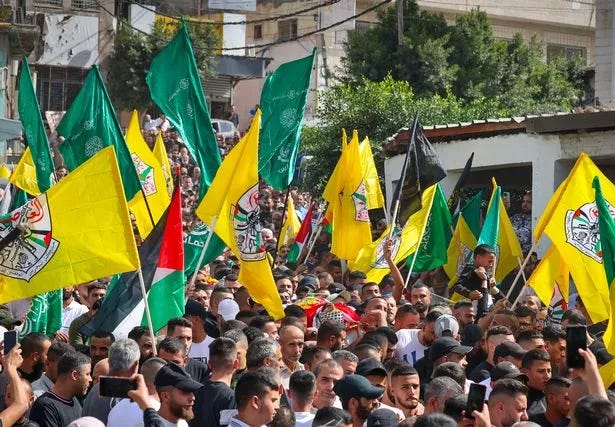
After the burial, attended only by men, with the custom that women may visit the burial sites a day later, mourners retired to a local hall of mourning. Hamas and Fatah posters with the mens’ photographs lined the walls on the approach to the mourning hall.
We may never know exactly what happened or why and how the two Palestinians were killed. It is believed some Palestinian young men were protesting after another early hours raid on a home in the camp as Israel continues with its security crackdown. But it is not known if these two men were involved and if they were, what they were doing. It is common for soldiers to have stones thrown at them during or after raids.
Today’s latest deaths mark an escalating pattern of violence here in the Middle East. Fifty miles away the smaller of the two Palestinian communities Gaza was being pounded by Israeli warplanes as another small aid shipment was allowed in.
Israel is widely expected to launch a ground offensive in Gaza following Hamas' brutal Oct. 7 rampage into southern Israeli communities. Tanks and troops are massed at the Gaza border, and Israel has stepped up airstrikes to reduce the risk to troops in the next stages. Fears of a widening war have grown as Israeli warplanes have struck targets in the occupied West Bank, Syria and Lebanon in recent days. It has frequently traded fire with Lebanon's Hezbollah militant group, which is better armed than Hamas with tens of thousands of rockets.
The relentless cycle of threat and counter-threat, strike and counter-strike is almost out of control. PM Benjamin Netanyahu warned troops in northern Israel on Sunday that if Hezbollah launches a war, "it will make the mistake of its life.”
Israel’s Rear Adm. Daniel Hagari said troops had wiped out eight militant cells in Lebanon over the past 24 hours and more than 20 since the start of the war.
More than 1,400 people in Israel have been killed - mostly civilians slain during the initial Hamas attack. At least 222 people were captured and dragged back to Gaza, including foreigners. Two Americans were released Friday, hours before the first shipment of humanitarian aid. More than 5,000 Palestinians, including some 2,000 minors and around 1,100 women, have been killed, the Hamas-run Health Ministry claims.
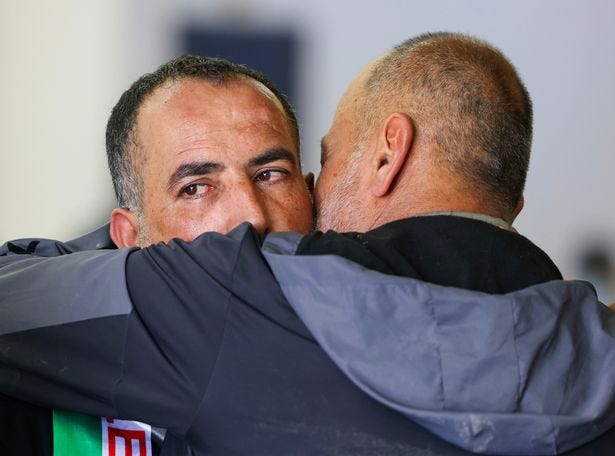
This is the deadliest of five wars fought between Israel and Hamas in less than 15 years. Israel has carried out limited ground forays into Gaza. The Israeli military said a soldier was killed and three others were wounded by an anti-tank missile during a raid inside Gaza. The military said the raid was part of a hostage rescue mission. The aid was allowed in at the request of the United States, and included water, food and medical supplies.
It is believed Netanyahu and US President Joe Biden have agreed on a continued flow of aid into Gaza. Relief workers said far more aid was needed to address Gaza’s spiraling humanitarian crisis, where half the territory's 2.3 million people have fled their homes.
The World Health Organization said seven hospitals in northern Gaza have been forced to shut down due to damage from strikes, lack of power and supplies, or Israeli evacuation orders. Fuel shortages have crippled water and sanitation systems.
Hundreds of thousands of Palestinians sheltering in U.N.-run schools and tent camps are running low on food and are drinking dirty water. Israel repeated its calls for people to leave northern Gaza, including by dropping leaflets from the air. It estimated 700,000 have already fled. But hundreds of thousands remain.
Secretary of State Antony Blinken said Israel "can't go back to the status quo" in which Hamas controls Gaza and is able to threaten it, but that Israel has "no intent" to govern it. He said:"Something needs to be found that ensures that Hamas can't do this again, but that also doesn't revert to Israeli governance of Gaza. It's something that needs to be worked on even as Israel is dealing with the current threat."
Israel withdrew troops and settlers from Gaza in 2005, but Israel and Egypt have imposed a blockade of varying degrees since Hamas seized power in 2007. Heavy Israeli airstrikes and shelling continued overnight across Gaza.
The Palestinian Red Crescent medical service reported heavy overnight airstrikes near al-Quds hospital in Gaza City. Aside from patients, the hospital houses more than 12,000 displaced people, it said. The Israeli military says it does not target civilians.
A British mother stuck in Gaza with her children said she has experienced "all sorts of horrible things". Stephanie Abwasi, her husband and four children moved from Blackpool, Lancashire, to Gaza a year ago and hope to flee to Egypt. She said: "We've experienced bombing and planes flying over us and buildings destroyed - all sorts of horrible things. It's not been a good experience."
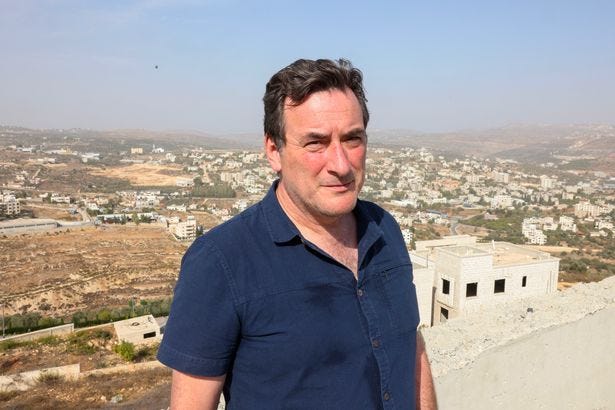
The family escaped their home in northern Gaza at night and journeyed to Khan Yunis, a city in southern Gaza. Ms Abwasi said: "A building very close to us on our street was destroyed. We had to flee the house, flee our flat where we were living and go to Khan Yunis and stay with family members."
The family were staying in Northern Gaza to allow their children to learn Arabic. They are waiting for the Rafah crossing on the Egyptian border to open so they can reach safety. It is not open for foreign nationals seeking to flee Gaza.
More than 5,087 people have been killed in Gaza, according to the Hamas-run health ministry. It says Palestinian militants have fired over 7,000 rockets at Israel since the start of the war. The military said Monday that it had struck 320 militant targets throughout Gaza over the last 24 hours. It said it had destroyed anti-tank positions and other targets that could endanger forces preparing for "a maneuver in the Gaza Strip," an apparent reference to a ground operation.
Tensions are also high in the Israeli-occupied West Bank, where over 90 Palestinians have been killed since the start of the war, mainly during violent protests and gun battles during military arrest raids.
Thank you
I hope you’ve enjoyed my latest newsletter. If you have been forwarded this email and would like to sign up, you can do that right here.
Let me know your thoughts in the comments.
Chris


